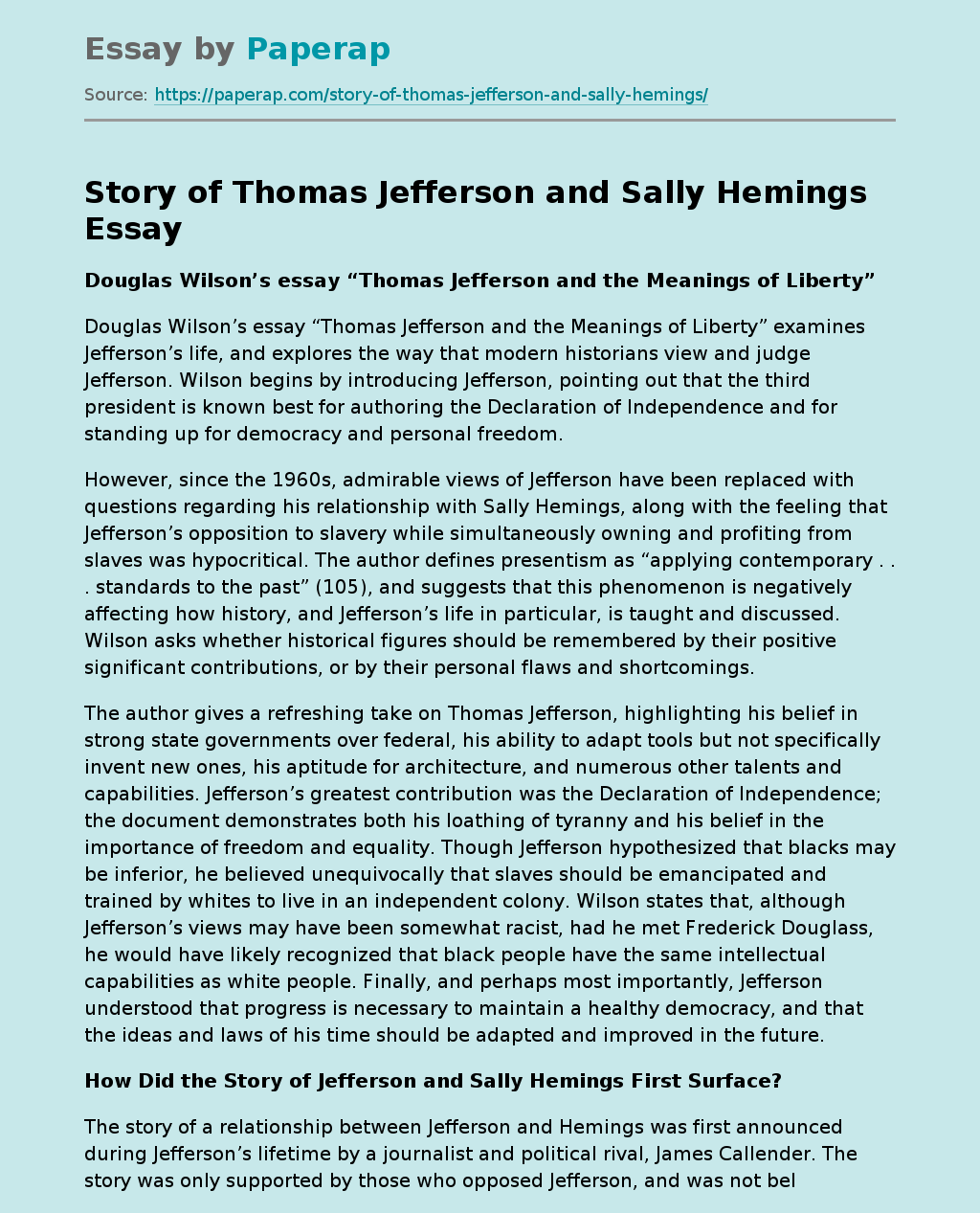Story of Thomas Jefferson and Sally Hemings
Douglas Wilson’s essay “Thomas Jefferson and the Meanings of Liberty”
Douglas Wilson’s essay “Thomas Jefferson and the Meanings of Liberty” examines Jefferson’s life, and explores the way that modern historians view and judge Jefferson. Wilson begins by introducing Jefferson, pointing out that the third president is known best for authoring the Declaration of Independence and for standing up for democracy and personal freedom.
However, since the 1960s, admirable views of Jefferson have been replaced with questions regarding his relationship with Sally Hemings, along with the feeling that Jefferson’s opposition to slavery while simultaneously owning and profiting from slaves was hypocritical.
The author defines presentism as “applying contemporary standards to the past”, and suggests that this phenomenon is negatively affecting how history, and Jefferson’s life in particular, is taught and discussed. Wilson asks whether historical figures should be remembered by their positive significant contributions, or by their personal flaws and shortcomings.
The author gives a refreshing take on Thomas Jefferson, highlighting his belief in strong state governments over federal, his ability to adapt tools but not specifically invent new ones, his aptitude for architecture, and numerous other talents and capabilities.
Jefferson’s greatest contribution was the Declaration of Independence; the document demonstrates both his loathing of tyranny and his belief in the importance of freedom and equality. Though Jefferson hypothesized that blacks may be inferior, he believed unequivocally that slaves should be emancipated and trained by whites to live in an independent colony. Wilson states that, although Jefferson’s views may have been somewhat racist, had he met Frederick Douglass, he would have likely recognized that black people have the same intellectual capabilities as white people.
Finally, and perhaps most importantly, Jefferson understood that progress is necessary to maintain a healthy democracy, and that the ideas and laws of his time should be adapted and improved in the future.
How Did the Story of Jefferson and Sally Hemings First Surface?
The story of a relationship between Jefferson and Hemings was first announced during Jefferson’s lifetime by a journalist and political rival, James Callender. The story was only supported by those who opposed Jefferson, and was not believed by most of the public or by scholars at the time. In 1974, Fawn Brodie released a popular book which strove to prove that Jefferson and Hemings had a long and happy relationship. Until that point, the idea of such a relationship was seen as “scandalous, hypocritical, or shameful,” while Brodie painted a picture of “lovers, bravely defying the conventions of a sexually puritanical and racist society.” In the 70s, a positive depiction by Brodie and a progressive shift among the public caused many Americans to believe the story and empathize with Jefferson. Wilson’s article, which was published in 1991, attempts to discredit Brodie’s account. Wilson’s perspective demonstrates an attempt to stick to the facts to report what is known for sure and avoid presentism. However, we now know almost certainly that the two did have a relationship, as Jefferson’s estate confirmed DNA tests which showed that Jefferson had children with Hemings.
What Were Jefferson’s Views on Slavery, and What Obstacles Did He and Other Planters Face When Contemplating the Issue of Emancipation?
Thomas Jefferson believed that slaves should be freed as they were in the Northern states, but did not think that freed African slaves and white European cultures could coexist. Thus, Jefferson proposed that all slaves be emancipated, taught to be independent, and given the necessary components to live in their own colony.
Story of Thomas Jefferson and Sally Hemings. (2021, Nov 17). Retrieved from https://paperap.com/story-of-thomas-jefferson-and-sally-hemings/

